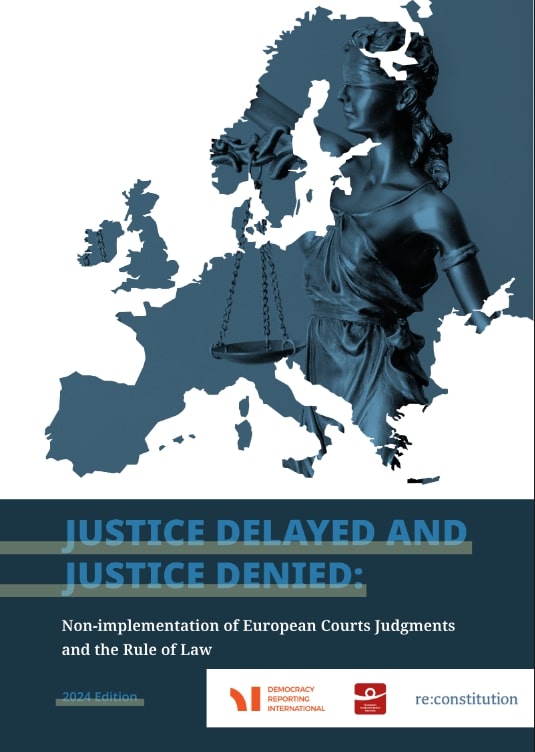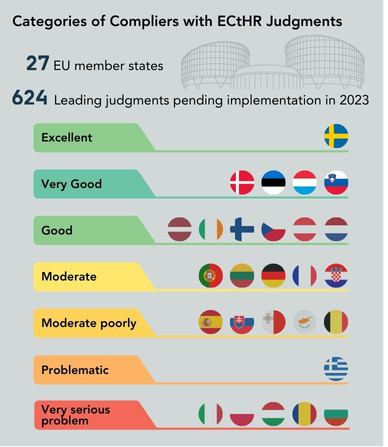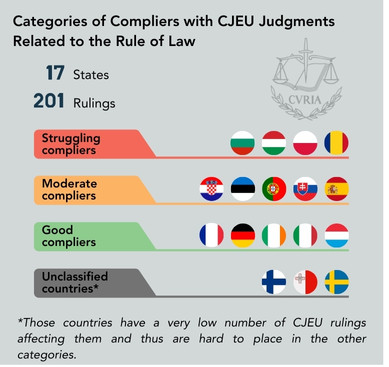A significant number of EU member states are either failing to implement or are significantly delaying the implementation of crucial rulings from the Court of Justice of the European Union (CJEU) and the European Court of Human Rights. (ECtHR).
With this finding, the third edition of our report “Justice Delayed, Justice Denied: (Non) implementation of European Courts Judgments and the Rule of Law” confirms the trend of the two previous editions: The non-implementation of European courts’ rulings by member states is a systemic problem in the EU.
The EU member states are bound by the rulings of the CJEU and the ECtHR. When national authorities fail to implement these decisions, they weaken the courts’ authority and sustain legislation that violates the European Convention on Human Rights and EU law.
Implementation Delays Lead to Human Rights Infringements
Government responses to the growing rule of law crisis are often inadequate, ranging from slow compliance with rulings to outright resistance and proactive efforts to undermine the courts’ authority. This is leading to prolonged rule of law and human rights infringements and have far-reaching consequences for individuals who are denied timely justice.

Report’s launch event
State Compliance Record with the European Court of Human Rights (ECtHR) Judgments
As of January 1, 2024, a total of 624 leading judgments from the European Court of Human Rights (ECtHR) remained unimplemented across EU member states, marking an increase from 616 in 2022 and 602 in 2021. This rising backlog highlights a growing challenge in the enforcement of critical rulings designed to protect fundamental rights across Europe. In fact, 44% of the leading judgments issued in the past decade remain unimplemented, a troubling increase from 40% in 2022 and 37.5% in 2021. Even more concerning is the length of time these judgments remain pending: in 2023, the average duration for unresolved judgments was 5 years and 2 months, compared to 5 years and 1 month in 2022 and 4 years and 4 months in 2021.
Behind these stark statistics lie the stories of citizens who sought justice in Europe’s highest courts, hoping to find remedy and protection. However, many have been left in limbo, realizing that despite favorable rulings, states frequently fail to implement the courts’ decisions. The failure to enforce these rulings affects critical areas of human rights protection, including the conditions of detention, police mistreatment, the rights of individuals with mental disabilities, LGBTIQ+ rights, and issues surrounding asylum and migration. As the number of unimplemented rulings grows, so too does the impact on vulnerable individuals who rely on these judgments for safeguarding their rights.

State Compliance Record with the Court of Justice of the European Union (CJEU) Rulings Related to the Rule of Law
Our analysis of state compliance reveals that some EU member states comply with the CJEU rulings only partially – they follow the CJEU guidance to some extent but fall short of achieving full compliance. To better understand the varying levels of compliance, we divided them in three categories based on how consistently states adhere to CJEU rulings:
Struggling compliers are states where a significant portion of CJEU rulings have been pending for two years or more, or where compliance is only partial. Romania and Hungary, for instance, fall into this group, with 83.33% and 52.6% of rulings partially complied with, respectively. In these countries, long delays in compliance are common, with 50% of Romania’s rulings and 66% of Hungary’s pending for over two years.
Moderate compliers are states that have fully complied with between 50% and 80% of rulings. These countries, including Portugal, Croatia, and Estonia, demonstrate some degree of consistent adherence to CJEU rulings, though occasional delays or partial compliance remain an issue.
Good compliers are those that have complied with over 80% of rulings. Luxembourg, Germany, and France are examples of states in this category. While even these countries may face occasional legislative delays or judicial resistance, these occurrences are rare and non-systematic compared to struggling compliers.

Recommendations to the European Institutions
Based on the findings of this report, we recommend the following to the European Commission:
- Integration of Implementation Data: The Commission should continue incorporating ECtHR judgment implementation data into its annual Rule of Law Report, and systematically analyse and prominently feature compliance with CJEU rulings.
- Targeted Recommendations: The Commission should issue specific recommendations to states based on their implementation records of ECtHR and CJEU judgments related to the rule of law, and expand its reports to cover democracy and systemic fundamental rights violations, urging immediate action from states with recurring issues.
- Utilisation of Enforcement Tools: The Commission should use all available tools, including infringement procedures and financial pressure, to address member states’ failures to implement CJEU judgments, leveraging related ECtHR judgments as additional evidence.
- Enhanced Monitoring: The Commission should consider closer monitoring of the implementation of CJEU judgments, including preliminary rulings, and explore ways to support national-level mechanisms for their implementation.
- Prioritisation in EU Discussions: EU institutions should highlight the non-implementation of ECtHR and CJEU judgments as a priority rule of law issue in discussions with member state governments and parliaments.
- Funding for Implementation Activities: The EU should fund initiatives to enhance the implementation of ECtHR and CJEU judgments, particularly those led by civil society organisations and the Council of Europe.
